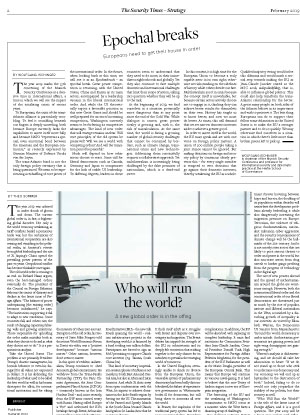Epochal breaks : Europeans need to get their house in order
The year 2019 marks the 55th convening of the Munich Security Conference at a decisive time in international affairs, a time in which we will see the impact of the escalating crises of recent years.
To Europeans, the crisis of the trans-Atlantic alliance is particularly troubling. To feel it crumbling beneath our fingers is deeply unsettling, both because Europe currently lacks the capabilities to assert itself more fully and because NATO “represents a special, even emotional bond between the American and the European continents,” as recently expressed by German Minister of Defense Ursula von der Leyen.
The trans-Atlantic bond is not the only foreign policy certainty that is being questioned. We seem to be experiencing a reshuffling of core pieces of the international order. In the future, when looking back at this time, we will see it as an Epochenbruch – an epochal break. Great power competition is returning, with the United States, China and Russia as its main actors, accompanied by a leadership vacuum in the liberal international order. And while the US theoretically enjoys a favorable position in this new Great Game and should be well prepared for an era of increasing competition, Washington currently seems to be forfeiting its competitive advantages. The kind of new order that will emerge remains unclear. Will core principles of the old system be preserved? Will we see a world with competing orders? And will the transition period be peaceful? Much will depend on how other actors choose to react. Some call for liberal democracies such as Canada, Germany and Japan to compensate for the lack of stable US leadership. To differing degrees, leaders in these countries seem to understand that they need to do more, in their immediate neighborhoods and globally. Yet they also continue to face multiple domestic and international challenges that limit their scope of action, calling into question whether they will be up to the task.
At the beginning of 2019, we find ourselves in a situation potentially more dangerous than at any point since the end of the Cold War. While dialogue is scarce, great power rivalry is growing and, with it, the risk of miscalculation. At the same time, the world is facing a growing number of global security challenges that cannot be contained by borders, such as climate change, transnational crime and new technologies. Addressing them successfully requires a collaborative approach. Yet multilateralism is increasingly being challenged by the false promises of nationalism, which is a dead-end street. In this context, it is high time for the European Union to become a truly capable actor in its own right; otherwise we risk standing on the sidelines of history while others decide our fate. Multilateralism is not in crisis because the concept itself is unworkable, but because certain actors actively choose not to engage in it, thinking they can achieve better results for themselves on their own. History has taught us to know better, and now we must do better. At times, this will demand that we set narrow domestic interests aside to achieve a greater good.
In order to assert itself in the world, the EU must speak and act with one voice on foreign policy matters. A union of 500 million people taking a joint stance cannot be ignored. But making decisions on foreign and security policy by consensus clearly prevents this – for every single member is tempted to veto decisions that go against their domestic interests, thereby weakening the EU as a whole. Qualified majority voting would solve this dilemma and would mark a crucial step towards making the EU, as Jean-Claude Juncker stated at the MSC 2018, weltpolitikfähig, that is, able to influence global politics. This could also help transform the trans-Atlantic relationship for the better. A great many people on both sides of the Atlantic believe in its importance and wish to preserve it. The best thing Europeans can do to support their fellow trans-Atlanticists in the United States is to make the EU a stronger partner and to do so quickly. We may otherwise find ourselves in a situation in which there’s little more than broken pieces left to pick up.
WOLFGANG ISCHINGER
is chairman of the Munich Security Conference and professor for international security and diplomatic practice at the Hertie School of Governance.


